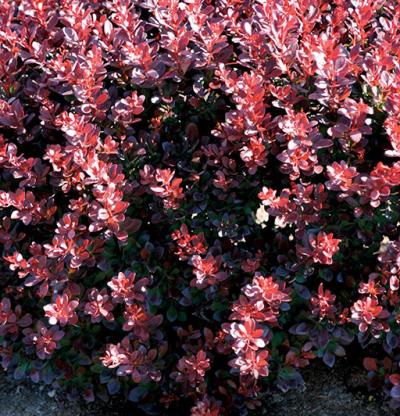





 Japanese barberry (Berberis thunbergii)
BER-ber-iss thun-BER-jee-eye
Genus:
Berberis
Grown for its neat habit, yellow flowers, and red fruit, this shrub spreads prolifically by seed and is considered invasive in some areas, including the Northeast. Alternatives include bayberry ( Myrica pensylvanica ) and winterberry ( Ilex verticillata ). The many cultivars include 'Atropurpurea Nana' (red-purple foliage); 'Aurea' (bright yellow young foliage); 'Pink Queen' (variegated); and 'Silver Beauty' (leaves mottled creamy white).
Noteworthy Characteristics:
Invasive. Attractive foliage.
Care:
Adaptable to most any soil in full sun to part shade.
Propagation:
Spreads prolifically by seed.
Problems:
Scale insects, mites, Japanese weevils. Canker, dieback, fungal leaf spots, powdery mildew, root rot, Verticillium wilt, rust diseases.
Japanese barberry (Berberis thunbergii)
BER-ber-iss thun-BER-jee-eye
Genus:
Berberis
Grown for its neat habit, yellow flowers, and red fruit, this shrub spreads prolifically by seed and is considered invasive in some areas, including the Northeast. Alternatives include bayberry ( Myrica pensylvanica ) and winterberry ( Ilex verticillata ). The many cultivars include 'Atropurpurea Nana' (red-purple foliage); 'Aurea' (bright yellow young foliage); 'Pink Queen' (variegated); and 'Silver Beauty' (leaves mottled creamy white).
Noteworthy Characteristics:
Invasive. Attractive foliage.
Care:
Adaptable to most any soil in full sun to part shade.
Propagation:
Spreads prolifically by seed.
Problems:
Scale insects, mites, Japanese weevils. Canker, dieback, fungal leaf spots, powdery mildew, root rot, Verticillium wilt, rust diseases.
Copyright © www.100flowers.win Botanic Garden All Rights Reserved